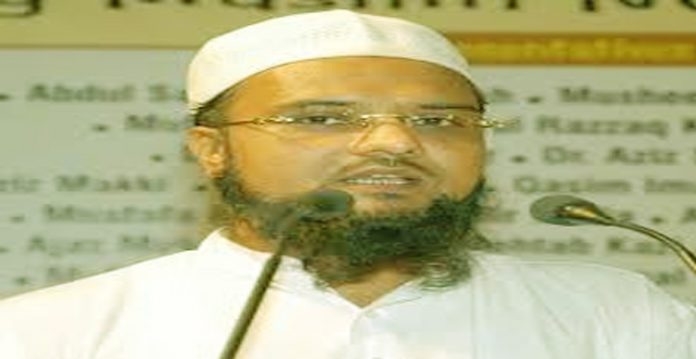Muslims in the nation are extremely concerned for the nation’s security and secularism in spite of an onslaught from certain powerful forces questioning their nationalistic credential, said Maulana Mohammad Burhanuddin Qasmi, a renowned intellectual, an Islamic scholar.
There is a tendency to continue shifting the terminologies for Muslims – from being orthodox, extremists, traditionalists, and now Islamists, said Qasmi, 49, Director of Markazul Ma’arif Education and Research Centre (MMERC), Mumbai.
Qasmi said to IANS in a freewheeling chat, “That has been the global norm since the dawn of human civilization with the stronger portraying themselves as ‘heroes’ and their weaker counterparts labeled as ‘villains’ always…The new terminologies we are witnessing today are simply marketing of the old poisons in a new wrapper only.”
Nonetheless, the world is observing a communication period and thanks to online media, “the complete monopoly of anyone over the dissemination of information to others” has been broken.
Qasmi highlighted that there are millions of good souls in the world who wish to take the right messages to the people and shun the ‘hate-campaign’ against Muslims…This positivity will definitely show the desired results.
Simultaneously, it additionally helps the mainstream Muslim scholars to participate in their academic and literary works deploying the new methods of communication technologies.
As far as the status of Indian Muslims is concerned, Qasmi believes it remains ‘greatly unchanged at the ground-level’, with disappointment, impatience, helplessness, and shades of dismay owing to the often one-sided and negative media onslaught both on the community and their religion.
Qasmi said that many have failed to grasp that the Muslims here are deeply concerned about their own and the country’s security and the democratic, secular image it enjoys, which is sought to be diluted.
He finds solace in the fact that most Indians don’t appear to be too happy about this continuous violation of the country’s socio-political scenario, yet are keeping quiet, barring a few bold voices.
Qasmi advised that the goings-on are merely a political narrative and part of attempts to ‘polarise communities’. He added, “I am worried that if extremism takes over the mainstream system of India, then not only the minorities, but also the democratic majority, and the very ‘idea of India’ will be at stake.”
The MMERC head chides the Muslim political, social, and religious leaders for not being serious or sufficiently acknowledging and rising to the difficult challenges faced by the community.
Qasmi advised that they must first sit together, diagnose the malaise proactively, offer positive solutions to problems and help the community integrate strongly with the national mainstream, both academically and economically. He included, “They must place themselves as ‘givers’ rather than as ‘receivers’ only.”
In this context, he finds “irritable” the attitude of immense sections of contemporary Indian media vis-a-vis the community, which can possibly destroy India’s worldwide standing and seriously harm the social balance.
Qasmi said that this needs to be checked with a genuine checks-and-balance mechanism in which the minority communities should have a say, the Muslim leaders must not hesitate to reach out to the media and explain their point of view for mutual and national gains.
Qasmi gained his Fazilat (Masters in Islamic Theology) from the renowned Darul Uloom Deoband, Uttar Pradesh, and a MA (English) from the Maulana Azad National Urdu University, Hyderabad.
Portraying MMERC as a remarkable institution that mixes contemporary and traditional religious education by teaching Madrassa graduates in modern subjects, Qasmi has written two books, lectured at national international seminars in the US, Gulf, South Asia, Europe, and different countries on academics and human rights.
withIANSinput


